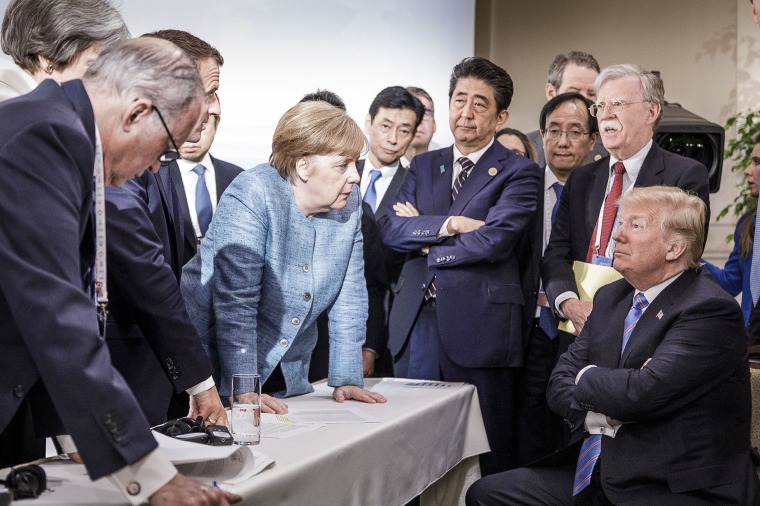It was two weeks ago today when the Wall Street Journal reported on a striking geopolitical decision out of the White House: Donald Trump is slashing the U.S. troop presence in Germany by nearly 30%. As part of the same directive, the American president is capping the number of American servicemen and women who can be deployed to Germany at 25,000, despite troop levels that are routinely twice as high.
As we discussed, the move stunned foreign officials and blindsided members of Trump's own team. Reuters reported soon after that the president made the decision without even notifying many leading officials at the Pentagon, the State Department, and the National Security Council.
This week, however, a new question came to the fore: did Trump actually make a decision or was he just saying things he didn't mean?
At a White House event on Monday, the president tried to defend the move, insisting that Germany "is very delinquent in their payments to NATO." That didn't make sense -- even now, Trump seems incapable of understanding how NATO works -- but as part of the same rant, the president added, "We'll see what happens."
That four-word caveat suggested Trump may not be cutting troop levels in Germany after all.
A day later, Kay Bailey Hutchison, the US ambassador to NATO, conceded that planning for the administration's announced troop withdrawal has not begun. She added, "I don't think anything has been set in concrete yet."
Yesterday, The Hill added this report:
The top U.S. Air Force general in Europe said Thursday he has not received orders from the White House to begin pulling airmen from Germany.... "I have not received any specific guidance directing me to do any specific planning on that at this particular point," U.S. Air Forces in Europe head Gen. Jeffrey Harrigian told reporters during a media call.
All of which raised an unsettling possibility: Trump may have just been popping off, making an important geopolitical national security announcement with no real forethought, and with no real plan to follow through.
If this dynamic sounds at all familiar, it's because questions like these come up with some regularity. Trump also recently announced, for example, that the United States has begun terminating its relationship with the World Health Organization. After the president made the declaration, his administration proceeded to take exactly zero steps to implement the change.
As we recently discussed, it's possible that these observations are premature. Maybe Trump will actually abandon the WHO and slash troop levels in Germany, but his administration moves slowly.
But it's also possible that Trump ... how do I put this gently ... just says random things that have no meaningful connection to reality.
To be sure, if the president's words were hollow in cases like these, it would be a positive development. The World Health Organization is far from perfect, but the idea that the United States would abandon it -- during a global pandemic, no less -- is indefensible. I'm glad the administration has failed to follow through on Trump's rhetoric, and I hope this continues. Similarly, handing the Kremlin another victory by moving thousands of American troops out of German strikes me as misguided.
But this nevertheless serves as an important reminder that Trump is an unreliable narrator about his own presidency. When he says he's poised to do something, there's simply no reason to accept his words at face value, and there's no reason to assume that thing will actually happen.
As regular readers know, this comes up with unnerving frequency. In 2018, for example, Trump announced delays to the implementation of a new trade agreement with our allies in South Korea. The Washington Post's David Ignatius said something memorable soon after: "I had a South Korean ask me, 'Were the president's comments about holding the new trade deal ... was that real? Did he really mean that? Or was he just ad-libbing?'
The questions were rooted in an awkward truth: no one, here or abroad, has any idea when Trump's words have value.
After Trump announced the end of DACA negotiations, the New York Times noted in passing, "It was unclear whether the president's tweets represented any change in his immigration policy, or were just the sort of venting he is known to do after reading a newspaper article or seeing a television program."
After Trump announced the imminent withdrawal of U.S. troops from Syria, Vox noted, "[O]f course, there's no indication that this represents actual policy as opposed to the ramblings of a president who is a strangely marginal figure in his own administration."
At a White House discussion on gun policy, Trump announced positions that he didn't mean. At a discussion on immigration, he did the same thing. Last year, the president declared via Twitter that he'd ordered FEMA to send California "no more money" to deal with wildfires. We later learned there was no such order; he simply made it up.
Vice President Mike Pence once said, "President Trump is a leader who says what he means and means what he says." It was among the more unintentionally hilarious things he's ever said.
